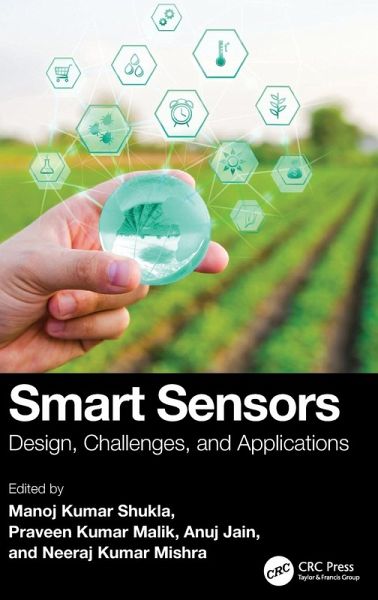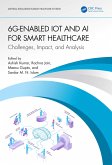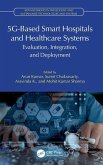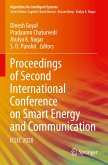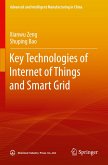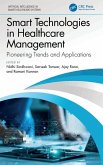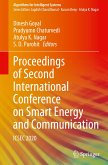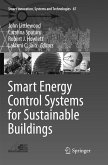Smart Sensors
Design, Challenges, and Applications
Herausgeber: Jain, Anuj; Malik, Praveen Kumar; Mishra, Neeraj Kumar; Shukla, Manoj Kumar
Smart Sensors
Design, Challenges, and Applications
Herausgeber: Jain, Anuj; Malik, Praveen Kumar; Mishra, Neeraj Kumar; Shukla, Manoj Kumar
- Gebundenes Buch
Andere Kunden interessierten sich auch für
![6g-Enabled Iot and AI for Smart Healthcare 6g-Enabled Iot and AI for Smart Healthcare]() 6g-Enabled Iot and AI for Smart Healthcare166,99 €
6g-Enabled Iot and AI for Smart Healthcare166,99 €![5g-Based Smart Hospitals and Healthcare Systems 5g-Based Smart Hospitals and Healthcare Systems]() 5g-Based Smart Hospitals and Healthcare Systems165,99 €
5g-Based Smart Hospitals and Healthcare Systems165,99 €![Proceedings of Second International Conference on Smart Energy and Communication Proceedings of Second International Conference on Smart Energy and Communication]() Proceedings of Second International Conference on Smart Energy and Communication269,99 €
Proceedings of Second International Conference on Smart Energy and Communication269,99 €![Key Technologies of Internet of Things and Smart Grid Key Technologies of Internet of Things and Smart Grid]() Xianwu ZengKey Technologies of Internet of Things and Smart Grid169,99 €
Xianwu ZengKey Technologies of Internet of Things and Smart Grid169,99 €![Smart Technologies in Healthcare Management Smart Technologies in Healthcare Management]() Smart Technologies in Healthcare Management155,99 €
Smart Technologies in Healthcare Management155,99 €![Proceedings of Second International Conference on Smart Energy and Communication Proceedings of Second International Conference on Smart Energy and Communication]() Proceedings of Second International Conference on Smart Energy and Communication270,99 €
Proceedings of Second International Conference on Smart Energy and Communication270,99 €![Smart Energy Control Systems for Sustainable Buildings Smart Energy Control Systems for Sustainable Buildings]() Smart Energy Control Systems for Sustainable Buildings123,99 €
Smart Energy Control Systems for Sustainable Buildings123,99 €-
-
-
Produktdetails
- Verlag: Taylor & Francis Ltd
- Seitenzahl: 320
- Erscheinungstermin: 7. Juli 2025
- Englisch
- Abmessung: 234mm x 156mm
- ISBN-13: 9781032746630
- ISBN-10: 1032746637
- Artikelnr.: 72802854
Hinweis: Dieser Artikel kann nur an eine deutsche Lieferadresse ausgeliefert werden.
- Herstellerkennzeichnung
- Libri GmbH
- Europaallee 1
- 36244 Bad Hersfeld
- gpsr@libri.de
Manoj Kumar Shukla is currently working as an Assistant Professor in Department of Robotics and Automation at Symbiosis Institute of Technology, Symbiosis International (Deemed University), Pune. He completed M. Tech and Ph.D. in Electrical Engineering from NIT, Hamirpur (Himachal Pradesh), India, in the year 2012 and 2019, respectively. His research interests mainly include control systems, robotics, artificial intelligence, smart sensors, IOT and automation. He has guided many B. Tech projects and M. Tech. dissertations. He has 10 years of teaching and research experience. He is reviewer of various reputed journals and has attended various international conferences. He has published research papers in various reputed journals and conferences. Praveen Malik is a Professor in the School of Electronics and Electrical Engineering, Lovely Professional University, Phagwara, Punjab, India. He received his Ph.D. in with a specialization in Wireless Communication and Antenna Design. He has authored or coauthored more than 150 technical research papers published in leading journals and conferences from publishers of international repute. Some of his research findings are published in top-cited journals. He has also published ten edited/authored books with International Publishers. He has guided many students leading to M.E./M. Tech and guiding students leading to Ph.D. He is an Associate Editor of different Journals. His current interest includes Microstrip Antenna Design, MIMO, Vehicular Communication, and IoT. He was invited as Guest Editors/Editorial Board Members of many International Journals, invited for keynote Speaker in many International Conferences held in Asia and invited as Program Chair, Publications Chair, Publicity Chair, and Session Chair in many International Conferences. He has been granted two design patents and a few are in pipelines. Anuj Jain is a dedicated academician and researcher currently working at Lovely Professional University in Punjab, India. Dr. Jain is a distinguished academician and researcher with a strong foundation in Electronics and Communication Engineering. Through his teaching career and research contributions, he has made significant strides in the domains of Network Security, IoT, and Artificial Intelligence. His commitment to knowledge dissemination and his ability to inspire and guide students have earned him respect within the academic community. Dr. Jain's work continues to shape the future of research and education, making him a valuable asset in the field. Neeraj Kumar Mishra is currently working as an Assistant Professor in the Department of Electrical Engineering at NIT Hamirpur, HP, India. He earned his B.E. in Electrical Engineering and M.E. in Measurement & Control from the Madhav Institute of Technology and Science, an autonomous institute under the MP State Government, India, in 2007 and 2011 respectively. He received his Ph.D. from the National Institute of Technology in Hamirpur, India, in 2022. As a distinguished academician and researcher, Dr. Mishra has made a significant impact at various prestigious NITs, including NIT Hamirpur and NIT Delhi. With a passionate commitment to teaching and an unyielding dedication to groundbreaking research, Dr. Mishra has notably advanced the field of Six-Phase Doubly Fed Induction Generators throughout his illustrious career. His extensive expertise spans multiple domains, including power electronics, machines, drives, wind energy generation systems, electric vehicles, conventional and non-conventional energy generation systems, artificial intelligence, machine learning, and artificial immune systems.
1. Multifunctional SERS Substrates for Smart Sensing: Principles,
Applications and Emerging Trends. 2. Smart Sensors: The Enablers of
Internet of Things. 3. Utilization of Smart Sensors in Localization,
Navigation and Mapping. 4. Future of Infrastructure Production: Exploring
Low-Cost Sensor Technologies. 5. Smart sensors for smart manufacturing. 6.
Smart Sensors Enabling Navigation and Mapping for Smart Farming. 7.
Structural Health Monitoring System: Vibration Analysis using a ZigBee
Module. 8. Wireless EEG Recording and ANN Classifier for Epileptic
Classification Using Particle Swarm Optimization. 9. Advancements in
Bilirubin Detection: Harnessing Smart Sensor Technologies for Improved
Diagnosis. 10. Development of Internet of Things based System for Home
Automation using Soft Computing. 11. Integration of Smart Sensors in
DFIG-Based Wind Energy Conversion Systems. 12. On the Potential of High
Electron Mobility Transistors as Smart Sensors.
Applications and Emerging Trends. 2. Smart Sensors: The Enablers of
Internet of Things. 3. Utilization of Smart Sensors in Localization,
Navigation and Mapping. 4. Future of Infrastructure Production: Exploring
Low-Cost Sensor Technologies. 5. Smart sensors for smart manufacturing. 6.
Smart Sensors Enabling Navigation and Mapping for Smart Farming. 7.
Structural Health Monitoring System: Vibration Analysis using a ZigBee
Module. 8. Wireless EEG Recording and ANN Classifier for Epileptic
Classification Using Particle Swarm Optimization. 9. Advancements in
Bilirubin Detection: Harnessing Smart Sensor Technologies for Improved
Diagnosis. 10. Development of Internet of Things based System for Home
Automation using Soft Computing. 11. Integration of Smart Sensors in
DFIG-Based Wind Energy Conversion Systems. 12. On the Potential of High
Electron Mobility Transistors as Smart Sensors.
1. Multifunctional SERS Substrates for Smart Sensing: Principles,
Applications and Emerging Trends. 2. Smart Sensors: The Enablers of
Internet of Things. 3. Utilization of Smart Sensors in Localization,
Navigation and Mapping. 4. Future of Infrastructure Production: Exploring
Low-Cost Sensor Technologies. 5. Smart sensors for smart manufacturing. 6.
Smart Sensors Enabling Navigation and Mapping for Smart Farming. 7.
Structural Health Monitoring System: Vibration Analysis using a ZigBee
Module. 8. Wireless EEG Recording and ANN Classifier for Epileptic
Classification Using Particle Swarm Optimization. 9. Advancements in
Bilirubin Detection: Harnessing Smart Sensor Technologies for Improved
Diagnosis. 10. Development of Internet of Things based System for Home
Automation using Soft Computing. 11. Integration of Smart Sensors in
DFIG-Based Wind Energy Conversion Systems. 12. On the Potential of High
Electron Mobility Transistors as Smart Sensors.
Applications and Emerging Trends. 2. Smart Sensors: The Enablers of
Internet of Things. 3. Utilization of Smart Sensors in Localization,
Navigation and Mapping. 4. Future of Infrastructure Production: Exploring
Low-Cost Sensor Technologies. 5. Smart sensors for smart manufacturing. 6.
Smart Sensors Enabling Navigation and Mapping for Smart Farming. 7.
Structural Health Monitoring System: Vibration Analysis using a ZigBee
Module. 8. Wireless EEG Recording and ANN Classifier for Epileptic
Classification Using Particle Swarm Optimization. 9. Advancements in
Bilirubin Detection: Harnessing Smart Sensor Technologies for Improved
Diagnosis. 10. Development of Internet of Things based System for Home
Automation using Soft Computing. 11. Integration of Smart Sensors in
DFIG-Based Wind Energy Conversion Systems. 12. On the Potential of High
Electron Mobility Transistors as Smart Sensors.

